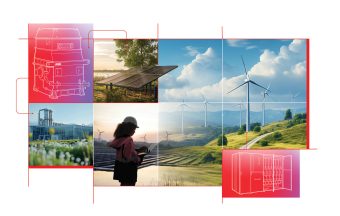In today’s business landscape, energy efficiency is no longer viewed as an optional initiative or a matter of corporate social responsibility. It has become a pillar of strategic positioning, a prerequisite for market survival, and a driver of technological modernization. With industry consuming more than 30 percent of the world’s total energy—45 percent of which is used solely by electric motor systems—it is clear that the real answer to energy, regulatory, and climate challenges lies in the way we manage existing resources.
The greatest potential often goes unnoticed—in the electric motors that power everyday processes in factories, pumping stations, transport lines, irrigation systems, and industrial plants of every kind. Statistics show that more than half of these motors are over 20 years old, often oversized for actual operational needs, lacking control capabilities, and incurring inefficiencies that quietly but steadily translate into higher costs and increased CO₂ emissions.
This is precisely where ABB, a global leader in electrification and automation, sees opportunities for both technological and economic advancement. Replacing conventional motors with new high-efficiency models in the IE4, IE5, and even IE6 classes—achieving efficiencies of up to 99.13 percent—combined with the integration of variable speed drives (VSDs) and digital monitoring, forms the backbone of a modern energy strategy. The essence lies not simply in replacing equipment, but in creating an intelligent system—one where motors operate neither more nor less than needed, where speed and load adjust in real time, and where every kilowatt is used purposefully.

When high-efficiency motors are paired with VSD technologies such as ABB variable speed drives, systems gain a new level of controllability. Instead of running at full capacity regardless of demand, motors become “smart”: responding to processes, conserving energy, and reducing wear. Although these technologies have been available for decades, only about 25 percent of industrial motors worldwide are currently connected to VSD systems—highlighting the vast potential still to be unlocked.
Industry case studies confirm the effectiveness of such solutions. At the Aurubis copper plant in Bulgaria, 460 motors were replaced, and ABB variable-speed drives were installed. The result: annual energy savings of 25 GWh and a return on investment within three and a half years. In Brazil, the utility company Saneago leveraged ABB Ability™ digital tools to cut energy costs by USD 700,000 annually, while simultaneously improving system availability and maintenance control.
In the agricultural sector—where balancing efficiency with resource sustainability is becoming increasingly critical due to climate change and mounting pressure on water supplies—smart solutions based on high-efficiency motors and variable speed drives (VSDs) deliver tangible benefits. In the United States, irrigation systems for large corn farms were upgraded with ABB VSD technologies, enabling precise pump operation tailored to actual crop needs and available water levels. The results were significant: electricity consumption decreased by 35 percent, while water usage was optimized and reduced by around 25 percent within a single season. The system achieved full payback in under two years, while simultaneously delivering higher yields and improved irrigation control.
IN FOCUS:
- The July Wildfire Wave In Serbia – An Alarm We Must Not Ignore
- The Primeval Forests of the Federation of BiH Among the Few in Europe
- Energy Advisory Centers: Knowledge as the Currency of Climate Policy
Digitalization adds further value to these technological solutions. By connecting motors and drives to IIoT sensors and advanced analytics platforms, operators can now monitor equipment performance in real time, predict failures, analyze consumption trends, and optimize processes in line with broader energy system requirements. When such technologies are integrated with factory-wide management systems and efficiency strategies, they open a new chapter in how production is planned and executed.
National strategies in major markets underscore the importance of energy efficiency. In China, as many as 86 percent of companies plan additional investments in efficient systems. At the same time, India has adopted a carbon credit framework that rewards industries for reducing emissions through the modernization of their equipment. Energy efficiency is no longer just a technical goal; it has become a tool for financial, regulatory, and competitive positioning.
ABB is also a technological leader in this field. In 2025, working with partners in India, the company set a new world record for industrial motor efficiency—99.13 percent. Crucially for the economy, the cost of this motor was only one percent higher than that of a conventional model, with a payback achieved in less than four months. This example demonstrates that sustainability and profitability are not opposing forces; in fact, they often align within the same business equation.
Global analyses indicate that doubling the rate of improvement in energy efficiency by 2030 could deliver one-third of all the emission reductions required to meet international climate targets. That achievement would be equivalent to the entire annual energy consumption of China. In this scenario, industry plays a pivotal role—but not alone. Public policies, tax incentives, and smart regulation can create an environment where energy efficiency is seen not as a cost, but as an investment with guaranteed returns.

Through its Top Industrial Efficiency initiative and participation in the international Energy Efficiency Movement, ABB is already connecting companies, institutions, and innovators to accelerate this transition. The movement aims to promote efficient solutions, share best practices, provide collaboration platforms, and work with strategic partners to demonstrate the benefits of energy efficiency initiatives. By optimizing the performance of industrial electric motors, it is possible to return more than 10 percent of electricity back to the grid—without spending trillions on new infrastructure.
In a rapidly changing world, energy-saving technologies are becoming the foundation of every intelligent business. ABB today delivers solutions that provide greater control, safer operations, and long-term savings—available now and applicable to nearly every industrial process. The challenges of the modern era demand concrete responses, and energy efficiency stands as one of the most powerful. For ABB, the future is sustainable only if it is efficient.
ABB
The story was published in Energy portal Magazine CLIMATE CHANGE

